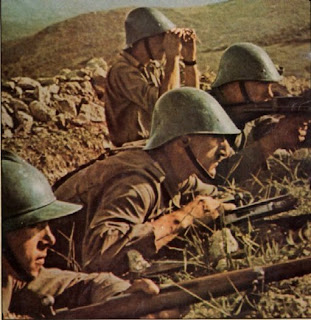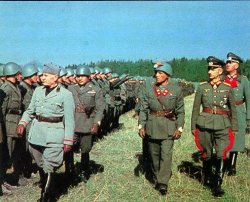Xenophon
Gone and forgotten
At 5:30 a.m. on 22 June 1941, the German ambassador met with Molotov to announce a declaration of war on the basis of gross and repeated violations of the Russo-German Pact. The two largest and most powerful armies ever assembled confronted each other along a 3,000 kilometer line from the Barents Sea to the Black Sea. While the Russians were well aware of German preparations, and were tipped off to the impending invasion by both their own intelligence, as well foreign sources, the Germans achieved total surprise. The Germans employed three army groups (North commanded by Field Marshal Wilhelm von Leeb, Center commanded by Field Marshal Fedor von Bock, and South commanded by Field Marshal Gerd von Rundstedt), and planned to destroy all Soviet resistance in swift advances on Leningrad, Moscow, and Kiev. Hitler threw 183 divisions into the assault, while the Nazis faced 170 divisions, which represented 54 percent of the Red Army's total strength. Subsequently, the German armies were to occupy a line reaching from Archangel on the White Sea to Astrakhan on the Caspian Sea.
The German invasion represented a great gamble. Germany was already at war with Great Britain and occupied much of Europe. Russia possessed an inhospitable climate, a vast area, and tremendous manpower reserves. Hitler himself expressed ambiguous feelings on Operation Barbarossa, the German codeword for the Russian invasion. To one of his generals he said, "We have only to kick in the door and the whole rotten structure will come crashing down," but shortly later he also stated, "At the beginning of each campaign one pushes a door into a dark, unseen room. One can never know what is hiding inside."
Coupled with the element of surprise, the Germans possessed better training, more extensive experience, and were able to obtain decisive superiority at the points selected for attack. The Russians had large amounts of obsolete equipment, were poorly deployed to meet the attack, and lacked defensive positions. As a result, the Russian frontier was quickly overrun and the Germans achieved penetrations in many places. By 16 July, 1941, the Germans had captured Smolensk, which was less than 250 miles from Moscow, and Army Group Center alone had captured about 600,000 men and 5,000 tanks.
The Soviet attitude can perhaps best be summarized by Molotov, who said, "Surely, we have not deserved that," when notified by the German ambassador, Friedrich von Schulenberg, that Germany had been forced to take 'counter-measures' in light of Russian military build-up on the border. Stalin is said to have had a "nervous collapse" when told of the invasion and did not speak for 11 days.
On 3 July, Stalin finally made a radio address to the Russian people, which contained several elements of Russian strategy. He evoked a sense of nationalism in his opening words: "Comrades, citizens, brothers, and sisters, fighters of our Army and Navy." He declared, "We must immediately put our whole production to war footing. In all occupied territories partisan units must be formed. . ." Stalin continued to say that losses had been severe and although the Red Army was putting up a heroic resistance, the country was in moral danger, but Stalin reminded them of the fates of Napoleon and Kaiser Wilhelm. Stalin justified the Russo-German Pact on the grounds that it gave the country the time to build its defenses. Stalin also announced a "scorched earth" policy to deny the Germans "a single engine, or a single railway truck, and not a pound of bread nor a pint of oil." He also announced with "a feeling of gratitude" the offers of assistance from Britain and the United States. So desperate did the Russians become during the early stages of Operation Barbarossa to gain any support and assistance, they even signed an agreement with the Polish government-in-exile, with whom they were not in speaking terms since the Russian occupation of Eastern Poland in September, 1939. By the end of July the Germans controlled an area of the Soviet territory more than twice the size of France.
The German invasion represented a great gamble. Germany was already at war with Great Britain and occupied much of Europe. Russia possessed an inhospitable climate, a vast area, and tremendous manpower reserves. Hitler himself expressed ambiguous feelings on Operation Barbarossa, the German codeword for the Russian invasion. To one of his generals he said, "We have only to kick in the door and the whole rotten structure will come crashing down," but shortly later he also stated, "At the beginning of each campaign one pushes a door into a dark, unseen room. One can never know what is hiding inside."
Coupled with the element of surprise, the Germans possessed better training, more extensive experience, and were able to obtain decisive superiority at the points selected for attack. The Russians had large amounts of obsolete equipment, were poorly deployed to meet the attack, and lacked defensive positions. As a result, the Russian frontier was quickly overrun and the Germans achieved penetrations in many places. By 16 July, 1941, the Germans had captured Smolensk, which was less than 250 miles from Moscow, and Army Group Center alone had captured about 600,000 men and 5,000 tanks.
The Soviet attitude can perhaps best be summarized by Molotov, who said, "Surely, we have not deserved that," when notified by the German ambassador, Friedrich von Schulenberg, that Germany had been forced to take 'counter-measures' in light of Russian military build-up on the border. Stalin is said to have had a "nervous collapse" when told of the invasion and did not speak for 11 days.
On 3 July, Stalin finally made a radio address to the Russian people, which contained several elements of Russian strategy. He evoked a sense of nationalism in his opening words: "Comrades, citizens, brothers, and sisters, fighters of our Army and Navy." He declared, "We must immediately put our whole production to war footing. In all occupied territories partisan units must be formed. . ." Stalin continued to say that losses had been severe and although the Red Army was putting up a heroic resistance, the country was in moral danger, but Stalin reminded them of the fates of Napoleon and Kaiser Wilhelm. Stalin justified the Russo-German Pact on the grounds that it gave the country the time to build its defenses. Stalin also announced a "scorched earth" policy to deny the Germans "a single engine, or a single railway truck, and not a pound of bread nor a pint of oil." He also announced with "a feeling of gratitude" the offers of assistance from Britain and the United States. So desperate did the Russians become during the early stages of Operation Barbarossa to gain any support and assistance, they even signed an agreement with the Polish government-in-exile, with whom they were not in speaking terms since the Russian occupation of Eastern Poland in September, 1939. By the end of July the Germans controlled an area of the Soviet territory more than twice the size of France.












